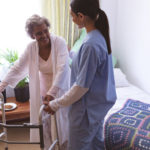What Are the Benefits of Seniors Aging in Place?
For so many seniors, aging in place is the only way they want to move forward in terms of their…
Too often, when things get really tough, tiring, physically exhausting, and emotionally draining, it’s easy to get want to give up. After all, if you don’t feel like any things are improving or progressing in the right direction, what’s the point?
This can often be the case for an older individual who was recently hospitalized and is now going through the recovery process. If they don’t see positive results right away, it becomes that much easier to want to give up, throw in the towel, and call it quits.
This can increase the risk of a hospital readmission.
Most people don’t know and don’t really care what a hospital readmission is, until it affects them directly. In technical terms, a hospital readmission is anytime somebody must be readmitted to the hospital within 30 days of their discharge date.

So, for example, an elderly person may have been in the hospital for several days fighting a bout of pneumonia, but was discharged to continue recovery at home.
Instead of following doctor’s instructions and resting, they go back to their normal routine. They may not see any difference. After all, when a person is discharged from the hospital with pneumonia, they are not likely exhibiting any real signs and symptoms of this illness.
In other words, they probably feel like normal. However, their body is still weak and still trying to fight back this infection. So, if they get back to their normal routine, start taking care of the yard, cooking and preparing meals for themselves, looking after their spouse, or even going to work, they run a very real risk of having to be readmitted.
And, if the have to be readmitted to the hospital for pneumonia say, on November 1, that’s a ‘readmission. And, odds are, it’s going to be much more severe and the chances of recovery fully may significantly diminished.
The longer recovery takes, the more frustrating it can be.
As another example, consider somebody who was injured in a slip and fall accident. They might’ve broken their hip. If they are in their 70s or 80s, the risk of mortality increases due to a broken hip (Schnell et al).
Plus, going through exhausting and possibly even painful physical therapy to recover from this injury can take weeks and even months. If they only put in minimal effort, don’t really believe it’s possible to recover fully, they run a greater and greater risk of losing their balance, becoming injured, or suffering a relapse.
It’s important to encourage older people to keep pushing through recovery so they can avoid a potentially costly hospital readmission.
If you are considering home care in NYC, for an aging loved one, please contact the caring staff at Touching Hearts At Home of NYC today at 212-201-6139.
For so many seniors, aging in place is the only way they want to move forward in terms of their…
Elder Care in Scarsdale NY: Memory declines gradually with age, but that doesn't mean seniors need to accept it.
Personal Care at Home in Westchester County NY: Seniors are at risk for a variety of different oral health conditions.
Home Care in Upper East Side NY: Recognizing when seniors need additional support is the key to getting home care…
Winter brings with it a lot of changes that can affect seniors, especially in terms of nutrition and hydration. Colder…
Malnutrition is something that impacts many seniors who are living on their own. As seniors get older, they may not…
Aging in place provides seniors with the comfort, familiarity, and independence they seek, allowing them to remain in their own…
Managing diabetes can be tough for seniors, especially if they have just recently been diagnosed. Learning how to manage their…
Seniors living with Alzheimer’s disease need a supportive and familiar home environment to maintain the highest quality of life. As…
Every November is National Family Caregivers Month, so it’s a great time for families to think about what’s working and…